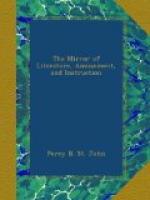* * * * *
PORSON.
The late professor having once exasperated a disputant by the dryness of his sarcasm, the petulant opponent thus addressed him:—“Mr. Porson, I beg leave to tell you, sir, that my opinion of you is perfectly contemptible.” Person replied, “I never knew an opinion of yours, sir, which was not contemptible.”
* * * * *
THE DRAMA AND ITS PROFESSORS.
(For the Mirror.)
It is remarkable with what difference actors were treated among the ancients. At Athens, they were held in such esteem, as to be sometimes appointed to discharge embassies and other negotiations; whereas, at Rome, if a citizen became an actor, he thereby forfeited his freedom. Among the moderns, actors are best treated in England; the French having much the same opinion of them that the Romans had; for though an actor of talent, in Paris, is more regarded than here, he nevertheless is deeply degraded. He may die amid applauses on the stage, but at his natural death, he must pass to his grave, without a prayer or de profundis, unless a minister of religion receives his last sigh.
Cromwell and his Puritans had a holy horror of actors. They pronounced them Sons of Belial! and professors of abomination. During the whole reign of the Republican Parliament, and Protectorate, the theatres of that day were closed, or, if opened by stealth, were subject to the visits of the emissaries of “Praise God Barebones,” “Fight the Good Fight,” and their crew. The actors were driven off the stage by soldiers, and the cant word of that period is still recorded, “Enter red coat, exit hat and cloak.” William Prynne was celebrated for his writings against the immorality of the stage, and the furious invectives of Jeremy Collier, are still extant; his pen was roused by Dryden’s Spanish Friar, and Congreve’s witty, but licentious comedies. Collier inveighed without mercy, but he certainly did much to reform the stage. Our Evangelicals and Methodists denounce the histrionic art to this day, with more than the zeal of the Church of Rome. But a follower of Wesley or Whitfield would not enter the den of abomination. Here, however, we take care all our comedies shall be purified, and our tragedies free, even from an oath; both are subject to the censor’s unsparing pen, and must be subsequently licensed by the Lord Chamberlain.
The actors in England, have, it is true, only become respectable within the last half century, and though they are termed his majesty’s servants, yet an unrepealed statute denounces them as vagabonds. As a body, numerous in itself, they are as free from crime as any other associated body or profession of men, and yet do they “his majesty’s servants” continue to lay under the stigma which the above unrepealed




